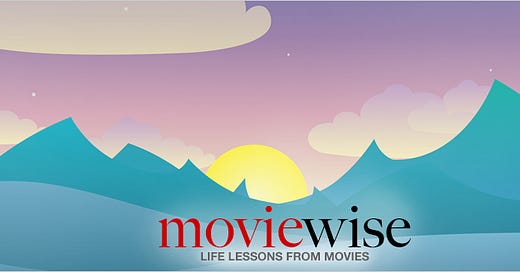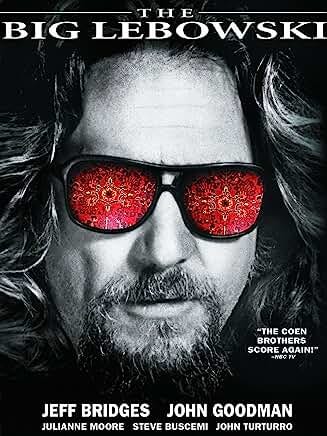Image by L.E. Wilson from RedBubble based on work by M. Maggs from Pixabay
A knee-jerk response to an action is not wise. Any reaction that is done without thought or care is most likely to cause more problems. This is self-evident. It’s obvious on its face, and yet it’s common for people to automatically retaliate when they feel that they’ve been wronged.
But enacting “an eye for an eye” solution to being victimized—particularly if questions of ethics, of propriety, of decency are ignored—just leads to an escalation of conflict, often resulting in a cycle of violence.
Such is the path that the Coen brothers’ funny, unconventional cult classic, The Big Lebowski (1998), takes us on. Through the main character, The Dude (Jeff Bridges), we learn something profound about reacting to negative events: everything gets worse when you don’t act virtuously.
This same message is echoed in another Coen brothers movie, A Serious Man (2009):
Life Lesson: Even if you think life is meaningless and unfair, be a good person with integrity, because without it things will get even worse.
🍿Movie Scene Link (movie quote)
The Big Lebowski (1998) is a dark comedy co-written and co-directed by Joel and Ethan Coen about The Dude (Jeff Bridges), a lazy unemployed man who is mistaken for a millionaire with the same name, Jeffrey Lebowski (David Huddleston), and inadvertently gets himself embroiled in an increasingly escalating series of conflicts.
Life Lesson: Life is a cycle of ups and downs, so take it easy on the downs.
🍿Movie Scene Link (movie quote)
Now, The Dude of The Big Lebowski is a charismatic character. He is quite lovable even though he embodies what many would call sins. Others may more charitably describe his lifestyle as appalling and degenerate. What are these negative traits? Well, he is above all a lazy man, unwashed, unkempt, unmotivated, unproductive, irresponsible, and constantly under the influence of drugs and alcohol. So how could such a man be the good guy, the likable hero?
As it turns out in the movie, The Dude is one of the few characters who is non-violent, doesn’t want to hurt or rule over anybody, and doesn’t have any strange hangups like sexual addiction or antisocial beliefs like nihilism. He is a good-natured, friendly, unpretentious everyman. Moreover, at first glance he appears to be the victim of a number of unfair, unfortunate events, so he has the audience’s sympathy.
But on closer inspection one realizes that much of the misfortune that rains upon him was set in motion by his own hand as a result of acting less than virtuously. He commits two wrongs in the beginning of the movie: he tries to get a blameless person, the wealthy Jeffrey Lebowski, to pay for damages caused by someone else, and he brazenly steals Mr. Lebowski’s expensive rug. For this he is punished severely through a series of mishaps that include physical injury and loss of property. Yet, The Dude perseveres.
In the end, it’s The Dude’s relaxed attitude toward setbacks that makes him appealing, and which actually promotes a healthy response to adversity. When things are not going well be Dude-like: take it easy, stay calm, be gentle. To do otherwise is to escalate into uncontrolled violence and chaos.
In many ways then, the The Big Lebowski is a continuation of the main theme in The Hudsucker Proxy (1994), an earlier Coen Brothers film that explores the Wheel of Fortune as explained in Boethius’ Consolation of Philosophy, which postulates that good and bad fortune come and go like the spokes of a spinning wheel. So when things are looking dire, when you’ve hit rock bottom, all you have to do is wait because the wheel of fortune will eventually turn again.
But what is the best way to wait and endure misfortune? Watch The Big Lebowski (1998) and see how The Dude abides. You’ll likely take comfort in knowing that there are people out there who believe in taking it easy when problems arise, which means de-escalation, i.e. peace.
Oh, and the music in this movie is excellent; it’s worth the price of admission alone. There is not one wrong note anywhere and it encompasses a wide range of genres that somehow fit harmoniously well together, from folk music to rock, Bob Dylan to ZZ Top, to Mozart, instrumental, and Western. It even includes a choreographed musical number featuring the song “Just Dropped in (to See What Condition My Condition Was in)” sung by Kenny Rogers.
It’s a fun, and wise, movie.
Visit the moviewise catalogue—a searchable database of one sentence movie summaries, movie quotes, and movie wisdom—for movie recommendations.
Also visit the moviewise store. Get a t-shirt, bag, or pillow with your favorite #LifeLesson from a movie. Reply to this or leave a comment below to make a request.










This was a great film, but I haven't seen it quite awhile. I should revisit it. Lebowski introduced me to the White Russian.